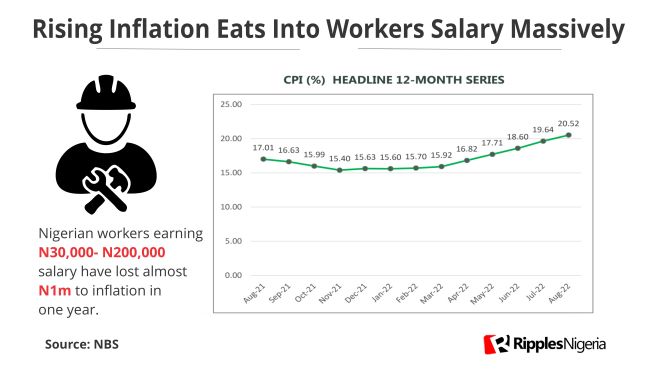Ripples Metrics
RipplesMetrics: Here is how much an average Nigerian worker lost in wages in one year; thanks to inflation

On Friday last week, the National Bureau of Statistics (NBS) announced Nigeria’s headline inflation rose 20.52 percent in August 2022 on a year-on-year basis. This is the highest level it has been since 2005.
For many Nigerians, it is just another number. However, a closer examination of the inflation figures provides an insight into the economic pressure faced by Nigerian workers.
This pressure is even made worse for a Nigerian worker within a salary range of N30,000 to N200,000 in the last one year.
When the above-mentioned salaries are calculated in real terms, or adjusted for inflation, the August inflation figure indicates that the total value of the above-mentioned categories of workers’ salaries had decreased to N972,082 per annum.
Breakdown
The National Minimum Wage is set at N30,000 per month, or N360,000 per year.
When the annual salary is adjusted for inflation, the take-home pay of an average worker within that salary is reduced by N61,295 in real terms.
Economists calculate workers’ real income by dividing their wages by the annual inflation rate. It is calculated as [Wages / (1 + 20.62%) = Real Income].
Using the above formula, an average Nigerian worker’s annual salary of N360,000, when adjusted for inflation, is actually N298,705, or N24,892 per month.
Other salary range breakdown
According to job websites analysis, the average starting salary of Nigerian graduates is at N100,000.
For a graduate who celebrated securing a job a year ago at N100,000 monthly and N1.2 million annually, what that salary can now buy has dropped by a whopping N204,315 as of the end of August 2022.
This is due to the fact that the N1.2 million annual salary is now worth N995,685 in real terms, or N82,973 monthly.
N150,000 salary range
For a N150,000 monthly salary earner or N1.8 million annually, the latest inflation figure means the annual salary is now N1.49 million. This comes to N124,460 monthly pay in real terms and a reduction of N306,472 on annual basis.
N200,000 salary range
For a Nigerian worker earning N200,000, the expected annual pay is N2.4 million.
But with inflation at 20.52 percent the annual pay is only N1.99 million meaning the economy has cut off over N400,000 from the salary of the worker.
Experts speak
Reacting to the latest inflation rate figure, the Chief Executive Officer of Financial Derivatives Company Ltd, Bismarck Rewane warned Nigerians to expect higher figures.
According to him the economy is still heavily dependent on oil revenue and importation and not yet fully diversified. He projected that inflation could hit as high as 44.51 if the National Bureau of Statistics attempts to reconstruct Nigeria’s inflation calculation.
“The weights of the components in the basket for evaluating the periodic Consumer Price Index (CPI) ought to be reviewed every five years to reflect the changing households’ consumption patterns especially in the face of COVID 19 which altered spending patterns as well as Nigeria’s changing demographics,” he argued.
Rewane also chided President Buhari’s leadership style saying it is making Nigerians poorer when compared to other past presidents.
In the August edition of the monthly Lagos Business School’s Breakfast Session, he noted that Buhari’s administration had delivered the poorest economic outcomes for Nigeria by comparing the country’s average Gross Domestic Product (GDP) growth rate, average inflation rate, percentage in exchange rate and foreign reserves with the presidential tenures of former presidents: Chief Olusegun Obasanjo, late Umaru Musa Yar’Adua, Dr. Goodluck Jonathan and that of the incumbent.
He said that the average GDP growth rate was 7.7 per cent, 7.1 per cent, 5.5 per cent and 1.1 per cent under the administrations of Obasanjo, Yar’Adua, Jonathan and Buhari respectively.
Also, the average inflation rate was 12.19 per cent, 13.18 per cent, 9.70 per cent and 14.07 per cent under the administrations of Obasanjo, Yar’Adua, Jonathan and Buhari respectively.
Moreover, the percentage change in exchange rate during the duration of each presidents was 26 per cent, 27.4 per cent, 63.5 per cent and 150.2 per cent for Obasanjo, Yar’Adua, Jonathan and Buhari.
Furthermore, in his comparison, Rewane also showed that the external reserves at the end of the tenures of Obasanjo, Yar’Adua, Jonathan and Buhari stood at $43.17 billion, $32.34 billion, $28.57 billion and $39.18 billion respectively.
Join the conversation
Support Ripples Nigeria, hold up solutions journalism
Balanced, fearless journalism driven by data comes at huge financial costs.
As a media platform, we hold leadership accountable and will not trade the right to press freedom and free speech for a piece of cake.
If you like what we do, and are ready to uphold solutions journalism, kindly donate to the Ripples Nigeria cause.
Your support would help to ensure that citizens and institutions continue to have free access to credible and reliable information for societal development.

























